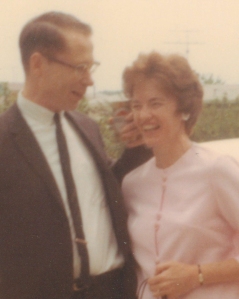My dad, like his father before him, worked as a salesman. I had long imagined that he entered the sales force as a last resort when he lost his position as a purchasing agent during the recession of 1960-61. A yellowing personality test, found among his belongings contained evidence that he actually wanted to pursue a career in sales. The test was conducted by an employment counselor who noted his surprise at Dad’s resolve and recorded his doubt that an obvious introvert would prosper on such an unsuitable career path. He suggested that the attraction to sales was most likely based on a desire to please his typically absent father.
Dad believed that his father had been an outstanding salesman. His father once told him that his prowess was so exceptional that after firing him for flinging anti-Semitic slurs at his boss, the company came crawling back to him and begged him to return. Not only did he get his job back, but he negotiated an increase in salary and a cut of the profits. Dad was simultaneously appalled and impressed. He didn’t repeat this story to any of his children until the last year of his life. More than 50 years after the conversation he remained bewildered by his father’s success despite such tactless behavior. He shook his head in wonder and declared, “Now, that would take a heck of a salesman…a heck of a salesman all right!”
During his first few months of unemployment, Dad tried his hand at selling door-to-door. He was enthusiastic about becoming a Fuller Brush man, but quickly discovered that in a recession, potential customers prefer to make do with their old equipment. Other door-to-door efforts were also fruitless: door-to-door sales were just not steady enough to support a growing family. Selling life insurance seemed a better prospect. My dad was a big believer in life insurance. “Everybody dies,” he said. Each time we drove past a cemetery, he could be counted on to ask, “Hey! How many people do you think are dead in that cemetery?” His offspring would chorus in response, “All of them, Daddy!” as our long-suffering mother rolled her eyes.
Dad was assigned a sales route called a “debit.” His job was to collect insurance premiums and sell those clients more insurance. The company imagined that a regular route would reveal changes in circumstance that could signal the need for another policy. A marriage, birth, divorce, a change in job all offered an opportunity to sell.
Dad believed in insurance, but he didn’t believe in pressuring someone to buy it. He worried about what could happen if his clients died without enough insurance, but he didn’t want any of them to buy something they really couldn’t afford. He regarded most of them as friends. They made him coffee and offered him food. They told him their problems. He listened. He knew their children by name. He rejoiced in their successes and grieved at their losses. He told them about his own family and shared jokes that were so bad they were funny. When they needed another day or two to come up with their premium, he’d volunteer to come back again later.
After a few extremely tight years, Dad’s sales “technique” resulted in sufficient referrals and commissions to keep him above water and in the good graces of his employer. One year he did so well that the won a vacation, but as an unimposing and honest salesman he would never earn more than enough to support his family. Still, he was happy with his work and wanted to excel, so he took additional training to become a CLU, a certified life underwriter. The courses were difficult and made him a little irritable, but he persevered and passed the test — adding the initials after his name on his business card. The future looked rosy.
Change came unexpectedly when the company announced the imminent abolishment of debit routes. It had become apparent that the return in sales was not worth the investment of neighborhood collections. Henceforth, they declared, salesmen would search for prospects throughout the region. A minimum commission must be achieved to earn a base salary. This was bad news indeed for an insurance man who didn’t want his clients to spend any more than they should. Things got tough and then tougher still. The monthly quota put a damper on Dad’s spirits until a further restructuring forced him into early retirement. Once again he was unemployed.
Dad maintained that everything would be okay, and it was. He formed a partnership with some co-workers and set up a short-lived independent insurance agency, he delivered newspapers in the wee hours of the morning, he worked as a security guard at night, he drove a school bus and somehow all of his kids went to college.
At my 40th high school reunion, I ran into a former classmate who told me that his mother had noticed my dad’s obituary in the newspaper. They reminisced about my dad and how they had looked forward to his visits. His mother remembered one particularly hot day when Dad arrived with his windows rolled up. “It must be nice to have air-conditioning in your car on a day like this!” she said. “Oh, no,” my dad replied, “I don’t have air-conditioning… I just rolled up the windows to make you think I did!” I didn’t expect to ever hear another one of dad’s jokes. I couldn’t believe one of his clients remembered it all those years. That’s when I knew: Dad was a heck of a salesman all right.


1 comment
Comments feed for this article
April 2, 2014 at 11:03 pm
kspalmer
This is a very nice tribute to your Father. I am especially fond of the end to this memory.